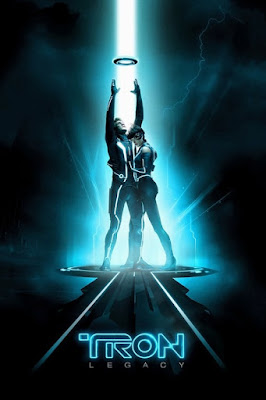Profoundly Naive and Unimaginably Wise: Disney’s Tron: Legacy
by Christian Wallace-Bailey
When thinking of philosophical engagements looking into the relationship between humanity and the ever-growing digital world, one probably shouldn’t count a Disney movie on their greatest hits list. Ex Machina, Black Mirror, and Her all come to mind, but I would argue there should be another inclusion on this list. The 2010 Walt Disney Pictures reboot of the eighties cyber fiction film Tron, entitled Tron: Legacy.
I’ve seen this movie probably at least 15 times. Do you know when you’re a kid and you just kind of need something to watch during school breaks when your parents don’t care to entertain you? This was that movie for me. I can recite most of this movie from memory and have the soundtrack burned into my brain from endless album repeats on my middle school MP3 player. In fact, I saw this movie only days after my 11th birthday, and I think I remember hyping it up to myself way too much at the time. I’ve always been a bit of a computer nerd (don’t judge me too harshly) and any movie containing digital transformation, a hero storyline, and a suitably edgy teen aesthetic was quite up my alley. It definitely still is.
I honestly didn’t know this was considered an extremely mid movie until adulthood. It sits at an unremarkable 51% critic score on Rotten Tomatoes, with only a 63% audience score (super scientific metrics here, bear with me) which isn’t horrible, but it’s not enough of a difference to say this movie gained cult status like the first one, nor that it is objectively good from a filmography standpoint. And honestly, it’s not. It screams 2010 in its cornea-burning use of 3D effects that never look good on any screen other than the one in the theater, and its obsessive use of mocap and blue screening throughout the film can make it hard to watch on modern TVs. One of the most glaring examples of this is the attempt to age-down Jeff Bridges’ face for the character Clu, meant to be a clone of Bridges’ character Kevin Flynn, entirely through motion capture and what would now equate to a high schooler’s attempt at AfterEffects. As an 11-year-old, this was the coolest thing since canned bread, but now it just looks like someone animated a wax Jeff Bridges statue. That the effects didn’t age well would be putting it mildly.
But god, do I love this movie. And I don’t care who says it’s bad.
For starters, the cast of this movie absolutely ate up what story the writers gave them. This film recycles some key actors from its primary source, like Jeff Bridges and Bruce Boxleitner, that in many ways creates continuity from the first movie to its spiritual sequel. The actual time that elapses between these two films is written into the storyline, so there aren’t any strange inconsistencies in the supposed age of the characters and their actors. It actually was filmed after a 20-year pause, so that time skip feels more believable. Plus, it helps that Bridges, an icon, is a genius in his tech god-turned-guru father figure character. You can tell he’s having fun.
Garrett Hedlund as the main character of Sam Flynn is somewhat unremarkable, I’ll give the critics that, but considering he acted about 80% of this film on a soundstage in a supposed virtual world, I think he can be forgiven (keep in mind, the Marvel era of effects domination was only just now getting started; Iron Man came out only two years previous). But Olivia Wilde as Quorra, an intelligent being born of an algorithm with immense knowledge who chooses to present as a cyberpunk goth girl? This slay was right on target. Current controversies notwithstanding, she did eat up this role and leave no crumbs. (Side note: Olivia ends up in a lot of cyber-y thinkpiece types of movies. What’s that about? Scroll down her IMDB and you’ll see what I mean!) The writers and Disney should be criticized for boxing most of the characters into predictable and problematic roles, but come on. It was 2010. Obama was barely president. Give me a break.
As a kid, the most remarkable elements of this movie were its effects and innovation in what films like this could look like, and it still gives me a shiver of nostalgia whenever I think about the Armory scene or the Scandic sparsity of Kevin Flynn’s “Shangri-La” on the Grid. But what interests me as an adult is this film’s maybe unintentional deep engagement with the idea of digital life and an existence interwoven with technology. Check out this bit of dialogue from Bridges’ character, talking about the nature of Quorra’s people, the ISOs:
They manifested, like a flame. They weren't really from anywhere. The conditions were right and they came into being. For centuries we've dreamed of gods, spirits, aliens, an intelligence beyond our own… I found them in here. Like flowers in a wasteland. Profoundly naive. Unimaginably wise.
(CHUCKLES)
They were spectacular. Everything I'd hoped to find in the system, control, order, perfection, none of it meant a thing. I'd been living in a hall of mirrors. The ISOs shattered it. The possibilities of their root code, their digital DNA. Disease? History. Science, philosophy, every idea man has ever had about the universe up for grabs.
Bio-digital jazz, man.
While this is mostly techno-garbage dreamed up by the writers to sound academic, the implications of their concept of digital life are fascinating. I get chills just while reading this stuff. As we think of a world where digital beings are growing more and more capable, with AI becoming integrated into more and more of our daily lives, this honestly doesn’t seem like total spiritual mumbo-jumbo as much as it did back then. What does it mean to have a world where digital beings born in digital spaces start creating themselves and other things?
Think of the current debate in the online art community around AI-generated artistic pieces. I’m sure you’ve seen the tweets where folks will give elaborate and complicated prompts to simple machine learning algorithms to generate what looks like, or could pass for, a real painting. Sometimes artists' original works are fed to these machines, spitting out something between an original work and a parody. Is that the right way to describe it? No one’s really sure. In our collective consciousness, art is a uniquely human generation, and any other attempts at “art” by a machine are merely the result of humanity’s intervention. But what about when that machine becomes smart enough to create on its own? Is that creation? Is that art? What about when a machine no longer needs human input to explore complex prompts and begins creating entirely original pieces?
The concept of the ISOs is a bit corny, I will admit. But it’s crazy to think of how radically close we are to something resembling this. We might not be able to jump into a computer the same way the Flynns do and live among the bio-digital jazz, but who’s to say that isn’t around the corner? Science fiction is a prediction of something that could possibly happen without divine intervention; that to me is what the ‘science’ part means. And it is the import of fiction to imagine someplace other than right now, and right here. So is it really that hard to think of a time when we surprise ourselves with a new digital being, thinking, creating, and existing, right before our very eyes? Nobody could even imagine widespread instant communication less than 50 years ago. Now I can check my friends’ location from my Apple watch in the shower. I won’t, but I could.
One of the parts of this film that truly ties the whole thing together is without a doubt its soundtrack. I believe that this was Daft Punk’s first full-length orchestral score, and certainly their most ambitious to date, and the choice to have electronic artists instead of a traditional film composer on the project paid off immensely. The creative blending of synths with orchestral elements signifies different shifts in the film’s world, moving between digital and human characters in spaces along with the music. The music feels almost like a companion to the film, and less like background music, in the way it presents itself to the audience. Daft Punk is first and foremost a performing musical act, and the energy with which they approach production lends this score a grandiose quality not always found in other films. Maybe they could have been tapped for more projects if the band didn’t split up. If “Derezzed” came on in an actual human club, people would lose their shit, I guarantee it.
Do I know this film has its issues? Certainly. Do I know it could have been done better and with more of an eye toward future-proofing? Probably. Do I still think in a roundabout way, that Olivia Wilde should be considered a Disney princess? Yeah, totally. Tron: Legacy is a film I always come back to for the mere fact that it shaped my childhood, my aesthetics, and honestly, my approach towards philosophical humanism, more than I realize sometimes. It taught me that yes, you can like computers and also be a well-adjusted person, and I think I needed to hear and practice that OFTEN as a preteen. And at least in part, I have Tron: Legacy to thank for that.
Just you wait until I can change my appearance by typing some code into a disc stuck to my back. It’ll be over for you hoes.



The only thing you missed is Michael Sheen’s iconic performance as Zuse. Otherwise this take is spot on.
ReplyDeleteTRUE
ReplyDeleteI agree with all of this. Sign me up for the fan club btw. I imprinted on it like a baby duck when it came out and I have rewatched it at least once a year since. (alyx is also right about michael sheen)
ReplyDelete